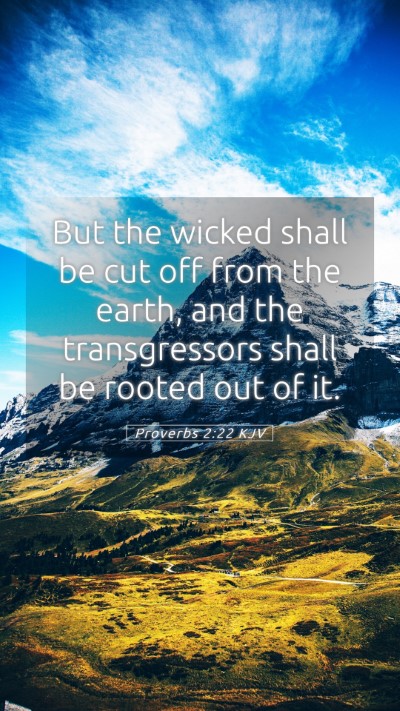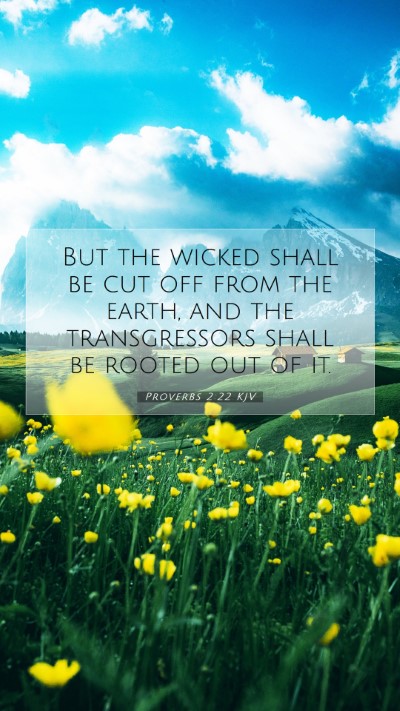Understanding Proverbs 2:22
Proverbs 2:22 states: "But the wicked will be cut off from the earth, and the treacherous will be rooted out of it." This verse succinctly encapsulates a theme of the book of Proverbs, focusing on the fate of the righteous versus the wicked. In this commentary, we explore the meaning of the verse through insights from public domain commentaries, including those of Matthew Henry, Albert Barnes, and Adam Clarke, providing a comprehensive Bible verse explanation.
Contextual Analysis
To fully grasp the meaning of Proverbs 2:22, it's essential to understand its context within the larger framework of the Proverbs. This passage concludes a discourse on the value of wisdom and the moral contrasts between the upright and the wicked.
Insights from Commentaries
-
Matthew Henry:
Henry emphasizes that this verse draws a stark line between the righteous and the wicked. He explains that the 'wicked' refers to those who deliberately oppose God's will, and their ultimate fate is separation from the land—a metaphor for God’s blessings. The 'treacherous' are described as those who betray trust and act deceitfully, suggesting their actions lead to their own downfall.
-
Albert Barnes:
Barnes reiterates the idea of divine justice present in the verse, asserting that wickedness leads to divine punishment. He points out that the language indicates an inevitable consequence of immorality: as one sows, so shall they reap. Barnes sees the 'cut off' as a significant warning to readers about the dire consequences of living contrary to divine wisdom.
-
Adam Clarke:
Clarke draws attention to the metaphor of being 'rooted out,' likening this to a tree that is taken up from its roots and destroyed. He comments on the permanence of the fate awaiting the wicked, emphasizing the idea that their evil deeds lead to their destruction, contrasting with the blessed state of the upright. Clarke highlights the notion of moral integrity as a foundation for a blessed life.
Key Themes
- Divine Justice: The verse underscores the theme of divine retribution—those who commit evil will face judgment.
- Moral Integrity: The contrast between the wicked and the righteous reveals the importance of living a life grounded in God's wisdom.
- Consequences of Actions: This verse serves as a serious reminder of the impending consequences of one's choices, reinforcing the principle that dishonest dealings will ultimately lead to ruin.
Biblical Cross References
- Psalm 37:9-10: "For evildoers shall be cut off; but those who wait for the Lord shall inherit the earth." This passage parallels the theme of retribution highlighted in Proverbs 2:22.
- Proverbs 10:30: "The righteous will never be removed, but the wicked will not dwell in the land." This reinforces the contrast made in our verse regarding the fate of the righteous versus the wicked.
- Isaiah 1:28: "But rebels and sinners shall be broken together, and those who forsake the Lord shall be consumed." This reflects the divine justice theme present in Proverbs 2:22.
Application for Today
In our modern context, Proverbs 2:22 offers profound Bible study insights. It encourages individuals to evaluate their moral choices and the company they keep. Engaging with this verse can serve as a guide in navigating today’s complexities, reinforcing the belief that righteousness leads to a more fulfilling life while warning against the consequences of treachery and wickedness.
For Bible Study Groups
This verse can be explored in Bible study groups to facilitate discussions on the nature of righteousness, the importance of integrity, and the consequences of moral failing. It provides an opportunity for engaging with the text deeply and understanding its implications for personal conduct and communal values.
Online Bible Study Resources
Utilizing online Bible study tools and resources can enhance one’s ability to analyze this verse and others. The insights from various commentaries, like those referenced here, can be instrumental in deepening one’s knowledge and understanding of Scripture.
Conclusion
Proverbs 2:22 serves as a critical checkpoint for examining one’s life in light of divine wisdom. By reflecting on the insights from prominent commentators and applying the lessons to daily life, believers can cultivate a stronger understanding of Biblical teachings. This not only enriches personal faith but also contributes positively to discussions within Bible study groups and broader community settings.


